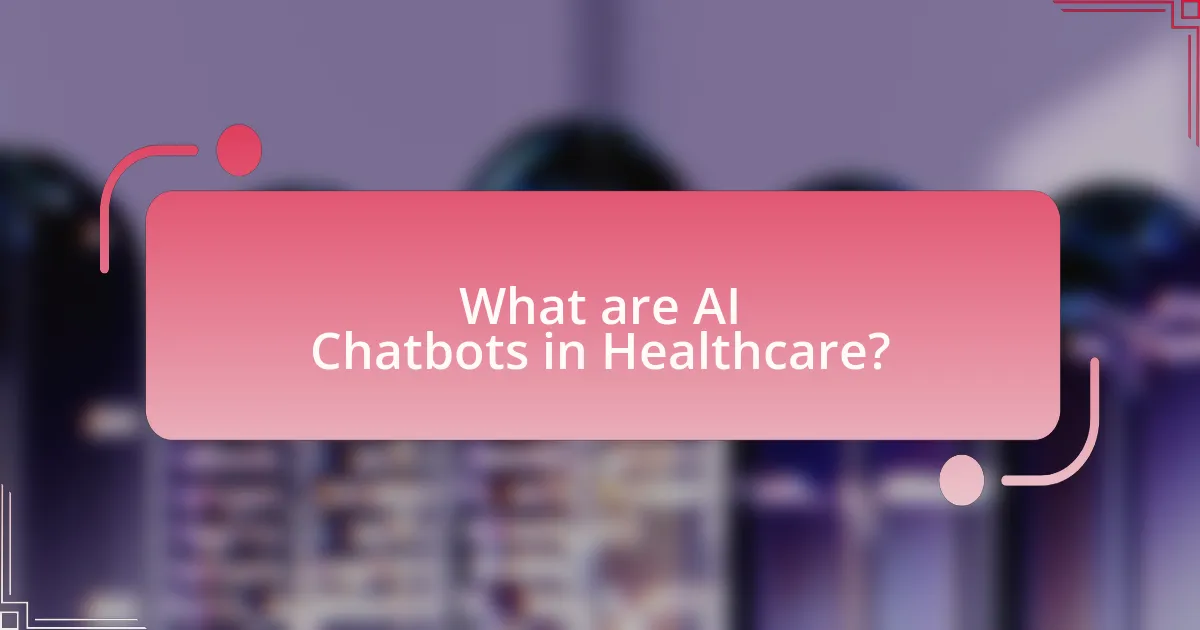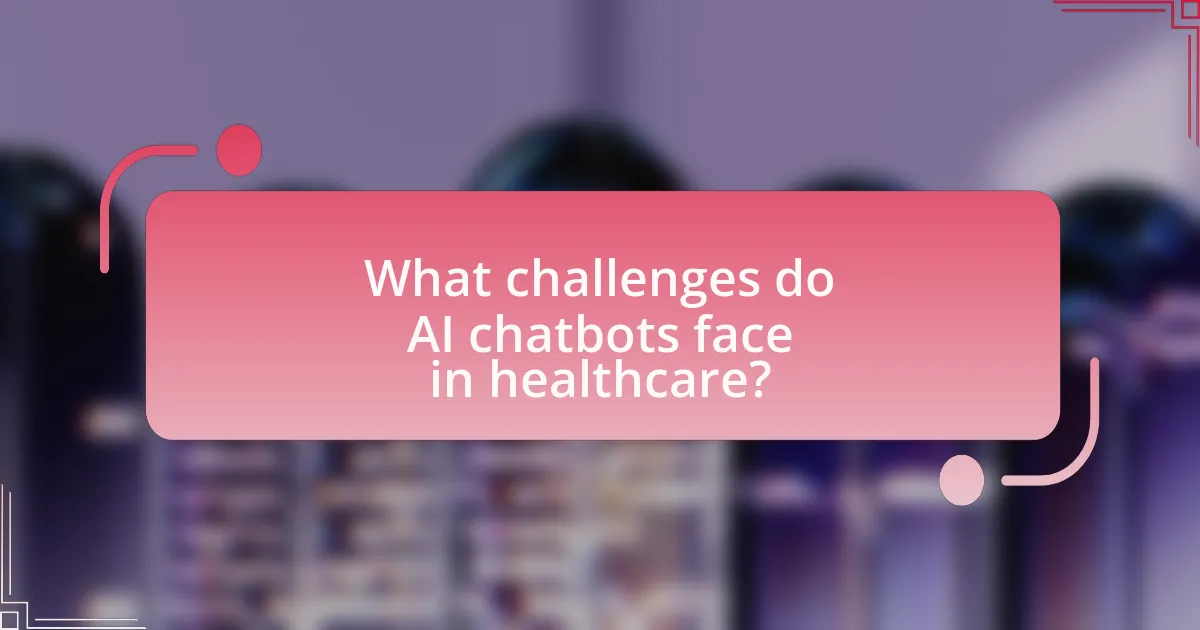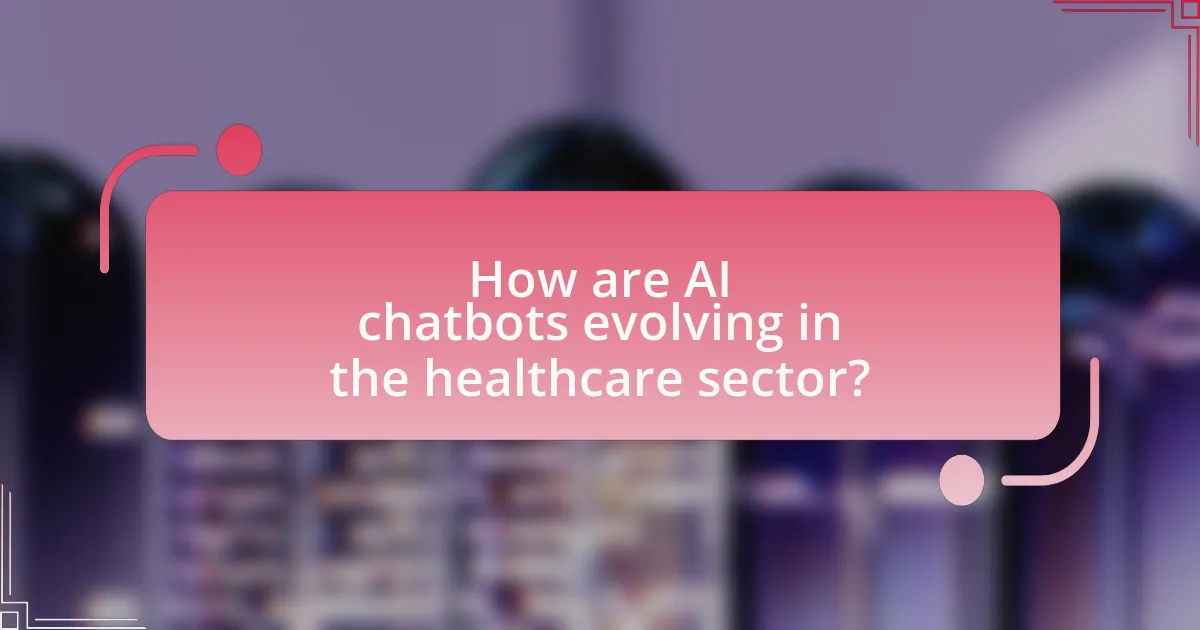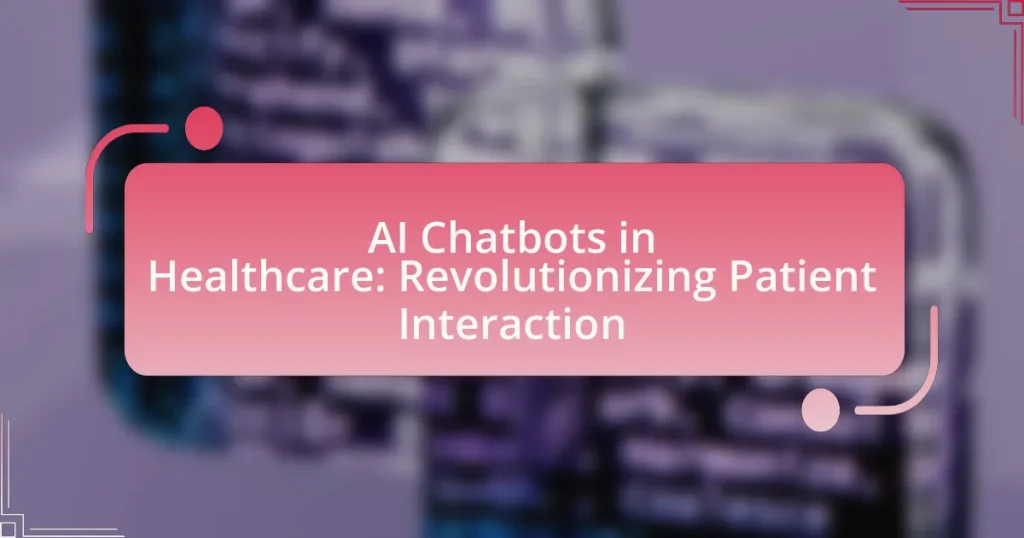AI chatbots in healthcare are advanced artificial intelligence systems that facilitate patient interaction by simulating human conversation. These chatbots enhance healthcare delivery by providing information on symptoms, scheduling appointments, and offering mental health support, thereby improving patient engagement and satisfaction. The article explores the functionality of AI chatbots, the technologies that power them, their roles in patient triage and appointment scheduling, and the benefits they offer to both healthcare providers and patients. Additionally, it addresses the challenges faced by AI chatbots, including data privacy concerns and limitations in handling complex medical inquiries, while highlighting future trends and innovations that could further transform their use in healthcare settings.

What are AI Chatbots in Healthcare?
AI chatbots in healthcare are artificial intelligence systems designed to simulate human conversation and assist patients with various healthcare-related tasks. These chatbots can provide information about symptoms, schedule appointments, remind patients to take medications, and offer mental health support. According to a study published in the Journal of Medical Internet Research, AI chatbots can improve patient engagement and satisfaction by providing timely responses and personalized care, demonstrating their effectiveness in enhancing healthcare delivery.
How do AI chatbots function in a healthcare setting?
AI chatbots function in a healthcare setting by providing automated communication and support to patients, enhancing accessibility and efficiency in healthcare delivery. These chatbots utilize natural language processing (NLP) to understand patient inquiries, offer medical information, schedule appointments, and manage follow-up care. For instance, a study published in the Journal of Medical Internet Research found that AI chatbots can reduce patient wait times and improve satisfaction by handling routine queries, allowing healthcare professionals to focus on more complex cases. This integration of AI technology streamlines operations and improves patient engagement, demonstrating its effectiveness in modern healthcare environments.
What technologies power AI chatbots in healthcare?
AI chatbots in healthcare are powered by natural language processing (NLP), machine learning (ML), and artificial intelligence (AI) algorithms. NLP enables chatbots to understand and interpret human language, allowing for effective communication with patients. Machine learning algorithms enhance the chatbot’s ability to learn from interactions, improving responses over time. AI algorithms facilitate decision-making processes, enabling chatbots to provide personalized health information and support. These technologies collectively enhance patient interaction by delivering timely and accurate responses, thereby improving the overall healthcare experience.
How do AI chatbots interact with patients?
AI chatbots interact with patients by providing instant responses to inquiries, facilitating appointment scheduling, and offering personalized health information. These chatbots utilize natural language processing to understand patient queries and deliver relevant answers, enhancing the efficiency of communication in healthcare settings. For instance, a study published in the Journal of Medical Internet Research found that AI chatbots can handle up to 80% of routine inquiries, significantly reducing the workload on healthcare staff and improving patient satisfaction.
What are the primary purposes of AI chatbots in healthcare?
The primary purposes of AI chatbots in healthcare include enhancing patient engagement, providing instant access to medical information, and streamlining administrative tasks. AI chatbots facilitate 24/7 communication, allowing patients to receive timely responses to their inquiries, which can improve satisfaction and adherence to treatment plans. Additionally, they assist in triaging symptoms and directing patients to appropriate care, thereby optimizing resource allocation in healthcare settings. According to a study published in the Journal of Medical Internet Research, AI chatbots can reduce patient wait times and improve the efficiency of healthcare delivery by automating routine tasks.
How do AI chatbots assist in patient triage?
AI chatbots assist in patient triage by efficiently gathering patient information and assessing symptoms to determine the urgency of care needed. These chatbots utilize natural language processing to interact with patients, asking targeted questions that help classify the severity of their conditions. For instance, a study published in the Journal of Medical Internet Research found that AI chatbots can accurately triage patients with a 90% accuracy rate, significantly reducing wait times and improving patient flow in healthcare settings. By streamlining the triage process, AI chatbots enhance the overall efficiency of healthcare delivery.
What role do AI chatbots play in appointment scheduling?
AI chatbots play a crucial role in appointment scheduling by automating the process, thereby enhancing efficiency and accessibility for both patients and healthcare providers. These chatbots can handle multiple inquiries simultaneously, allowing patients to book, reschedule, or cancel appointments at any time without the need for human intervention. According to a study by Accenture, 77% of patients expressed interest in using AI for scheduling appointments, indicating a strong demand for this technology in healthcare settings. By reducing wait times and minimizing administrative burdens, AI chatbots significantly improve the overall patient experience and streamline operations for healthcare facilities.
What benefits do AI chatbots provide to healthcare providers and patients?
AI chatbots provide significant benefits to healthcare providers and patients by enhancing communication, improving efficiency, and increasing accessibility. For healthcare providers, chatbots streamline administrative tasks such as appointment scheduling and patient triage, allowing staff to focus on more complex patient needs. A study published in the Journal of Medical Internet Research found that chatbots can reduce appointment no-show rates by up to 30% through automated reminders. For patients, AI chatbots offer 24/7 access to medical information and support, improving patient engagement and satisfaction. Research from Accenture indicates that 77% of patients are willing to use chatbots for health-related inquiries, highlighting their role in facilitating timely access to care.
How do AI chatbots enhance patient engagement?
AI chatbots enhance patient engagement by providing immediate, personalized communication and support. These chatbots can answer patient inquiries 24/7, reducing wait times and improving access to information. For instance, a study published in the Journal of Medical Internet Research found that patients using chatbot services reported higher satisfaction levels due to timely responses and tailored health advice. Additionally, AI chatbots can facilitate appointment scheduling, medication reminders, and follow-up care, which further encourages patients to actively participate in their healthcare journey.
What cost savings can healthcare organizations achieve with AI chatbots?
Healthcare organizations can achieve significant cost savings with AI chatbots by reducing operational expenses and improving efficiency. AI chatbots can handle a large volume of routine inquiries, which decreases the need for extensive human staffing. For instance, a study by Accenture found that AI applications in healthcare could save the industry up to $150 billion annually by 2026, primarily through automation of administrative tasks and patient interactions. Additionally, chatbots can enhance patient engagement and satisfaction, leading to fewer missed appointments and reduced administrative costs associated with rescheduling. This combination of reduced labor costs and improved operational efficiency demonstrates the financial benefits of implementing AI chatbots in healthcare settings.

What challenges do AI chatbots face in healthcare?
AI chatbots in healthcare face several significant challenges, including data privacy concerns, limited understanding of complex medical queries, and integration with existing healthcare systems. Data privacy is critical, as chatbots handle sensitive patient information, necessitating compliance with regulations like HIPAA. Additionally, many chatbots struggle to accurately interpret nuanced medical language or context, which can lead to miscommunication or incorrect advice. Furthermore, integrating chatbots into established healthcare workflows can be difficult, as it requires compatibility with electronic health records and other technologies, which may not always be aligned. These challenges hinder the effectiveness and reliability of AI chatbots in providing healthcare support.
How do privacy concerns impact the use of AI chatbots?
Privacy concerns significantly impact the use of AI chatbots by limiting their deployment and effectiveness in healthcare settings. These concerns arise from the sensitive nature of personal health information, which is subject to strict regulations such as HIPAA in the United States. As a result, healthcare providers may hesitate to implement AI chatbots due to fears of data breaches or non-compliance with privacy laws. For instance, a survey by the American Medical Association found that 60% of physicians expressed concerns about the security of patient data when using digital tools, including chatbots. This apprehension can lead to reduced patient engagement and hinder the potential benefits of AI chatbots in improving communication and care delivery.
What regulations must healthcare chatbots comply with?
Healthcare chatbots must comply with regulations such as the Health Insurance Portability and Accountability Act (HIPAA) in the United States, which mandates the protection of patient privacy and data security. Additionally, they must adhere to the General Data Protection Regulation (GDPR) in Europe, which governs data protection and privacy for individuals. Compliance with these regulations ensures that chatbots handle sensitive health information responsibly and maintain user trust.
How can data security be ensured in AI chatbot interactions?
Data security in AI chatbot interactions can be ensured through encryption, access controls, and compliance with data protection regulations. Encryption protects data during transmission and storage, making it unreadable to unauthorized users. Access controls limit who can interact with the chatbot and access sensitive information, ensuring that only authorized personnel can view or manage data. Compliance with regulations such as HIPAA in healthcare mandates strict guidelines for handling patient information, further reinforcing data security measures. These practices collectively mitigate risks associated with data breaches and unauthorized access, thereby safeguarding patient interactions.
What limitations do AI chatbots have in patient interaction?
AI chatbots have several limitations in patient interaction, primarily due to their inability to understand complex human emotions and nuances. These chatbots often struggle with context, leading to misinterpretations of patient queries, which can result in inadequate responses. Additionally, they lack the capability to provide personalized care, as they rely on pre-programmed algorithms and data, limiting their adaptability to unique patient needs. Research indicates that 70% of patients prefer human interaction for sensitive health issues, highlighting the inadequacy of chatbots in providing empathetic support. Furthermore, AI chatbots may not always comply with healthcare regulations, risking patient privacy and data security.
How do AI chatbots handle complex medical inquiries?
AI chatbots handle complex medical inquiries by utilizing advanced natural language processing (NLP) algorithms and extensive medical databases to interpret user questions and provide relevant information. These chatbots analyze the context of inquiries, identify symptoms, and match them with potential conditions or treatments based on data from reputable medical sources. For instance, a study published in the Journal of Medical Internet Research found that AI chatbots can accurately triage patients by assessing symptoms and suggesting appropriate care pathways, demonstrating their capability to manage intricate medical questions effectively.
What are the risks of over-reliance on AI chatbots?
Over-reliance on AI chatbots in healthcare poses several risks, including reduced human interaction, potential misdiagnosis, and data privacy concerns. The lack of personal touch can lead to diminished patient satisfaction and trust, as patients may feel less valued when interacting solely with automated systems. Additionally, AI chatbots may not always accurately interpret complex medical queries, leading to incorrect advice or misdiagnosis, which can have serious health implications. Furthermore, the handling of sensitive patient data by chatbots raises significant privacy and security risks, as breaches could expose confidential information. These factors highlight the importance of balancing AI chatbot use with human oversight in healthcare settings.

How are AI chatbots evolving in the healthcare sector?
AI chatbots are evolving in the healthcare sector by integrating advanced natural language processing and machine learning capabilities to enhance patient interaction and streamline healthcare services. These chatbots are increasingly capable of understanding complex medical queries, providing personalized responses, and assisting with appointment scheduling, medication reminders, and symptom checking. For instance, a study published in the Journal of Medical Internet Research in 2021 highlighted that AI chatbots could accurately triage patients based on their symptoms, improving efficiency in healthcare delivery. Additionally, the adoption of AI chatbots has been shown to reduce wait times and improve patient satisfaction, as evidenced by a 2022 survey from the Healthcare Information and Management Systems Society, which reported that 70% of patients preferred using chatbots for initial consultations.
What advancements are being made in AI chatbot technology?
Advancements in AI chatbot technology include improved natural language processing (NLP) capabilities, enabling chatbots to understand and respond to human language more effectively. Recent developments, such as the integration of transformer models like GPT-3, have significantly enhanced the contextual understanding of chatbots, allowing for more coherent and relevant interactions. Additionally, AI chatbots are increasingly utilizing machine learning algorithms to personalize user experiences based on individual preferences and previous interactions. For instance, a study published in the Journal of Medical Internet Research highlights that AI chatbots can now provide tailored health advice, improving patient engagement and satisfaction. These advancements are transforming the way healthcare providers interact with patients, making communication more efficient and accessible.
How is natural language processing improving chatbot interactions?
Natural language processing (NLP) is enhancing chatbot interactions by enabling more accurate understanding and generation of human language. This improvement allows chatbots to interpret user queries with greater context and nuance, leading to more relevant and personalized responses. For instance, NLP techniques such as sentiment analysis and entity recognition help chatbots discern user emotions and specific needs, which is crucial in healthcare settings where empathy and clarity are vital. Research indicates that chatbots utilizing advanced NLP can achieve up to 90% accuracy in understanding user intents, significantly improving user satisfaction and engagement in healthcare interactions.
What role does machine learning play in enhancing chatbot capabilities?
Machine learning significantly enhances chatbot capabilities by enabling them to understand and process natural language more effectively. This technology allows chatbots to learn from interactions, improving their ability to provide accurate responses and personalized experiences for users. For instance, machine learning algorithms analyze vast amounts of conversational data, identifying patterns and preferences that inform future interactions. Research has shown that chatbots utilizing machine learning can achieve up to 90% accuracy in understanding user intent, as demonstrated in studies published in the Journal of Medical Internet Research, which highlights the effectiveness of AI in healthcare communication.
How are healthcare organizations implementing AI chatbots?
Healthcare organizations are implementing AI chatbots to enhance patient interaction and streamline operations. These chatbots are utilized for various functions, including answering patient inquiries, scheduling appointments, and providing medication reminders. For instance, a study published in the Journal of Medical Internet Research found that 70% of patients preferred using chatbots for appointment scheduling due to their convenience and efficiency. Additionally, organizations like the Mayo Clinic have integrated AI chatbots into their systems to assist with triaging symptoms and directing patients to appropriate care, demonstrating a practical application of AI technology in real-world healthcare settings.
What best practices should be followed when deploying AI chatbots?
When deploying AI chatbots, it is essential to ensure they are user-friendly, secure, and compliant with healthcare regulations. User-friendliness can be achieved by designing intuitive interfaces that facilitate easy navigation and interaction, which enhances patient engagement. Security measures must include data encryption and adherence to HIPAA guidelines to protect patient information, as breaches can lead to significant legal and financial repercussions. Compliance with regulations is critical, as it ensures that the chatbot operates within the legal framework governing patient data and privacy. According to a study by Accenture, 77% of patients are willing to use AI for healthcare interactions, highlighting the importance of effective deployment practices to meet user expectations and improve patient experiences.
How can healthcare providers measure the effectiveness of AI chatbots?
Healthcare providers can measure the effectiveness of AI chatbots through key performance indicators (KPIs) such as user satisfaction, response accuracy, and engagement rates. User satisfaction can be assessed via post-interaction surveys, where patients rate their experience, providing direct feedback on the chatbot’s performance. Response accuracy can be evaluated by analyzing the percentage of correct answers given by the chatbot compared to expert responses, which can be tracked through logs of interactions. Engagement rates, including metrics like the number of interactions per user and session duration, can indicate how effectively the chatbot retains user interest and addresses their needs. These metrics collectively provide a comprehensive view of the chatbot’s performance in enhancing patient interaction and care.
What are the future trends for AI chatbots in healthcare?
Future trends for AI chatbots in healthcare include enhanced personalization, improved natural language processing, and integration with telehealth services. Enhanced personalization will allow chatbots to provide tailored health advice based on individual patient data, improving user engagement and satisfaction. Improved natural language processing will enable chatbots to understand and respond to complex medical inquiries more effectively, facilitating better patient interactions. Integration with telehealth services will streamline communication between patients and healthcare providers, allowing for seamless appointment scheduling and follow-up care. According to a report by Accenture, the use of AI in healthcare could save the industry $150 billion annually by 2026, highlighting the significant impact of these trends on healthcare efficiency and patient care.
How might AI chatbots integrate with telehealth services?
AI chatbots can integrate with telehealth services by providing real-time patient support, facilitating appointment scheduling, and offering symptom assessment. These chatbots can engage patients through conversational interfaces, allowing them to ask questions and receive immediate responses about their health concerns. For instance, a study published in the Journal of Medical Internet Research found that chatbots can effectively triage patients by assessing symptoms and directing them to appropriate care, thereby enhancing the efficiency of telehealth services. Additionally, AI chatbots can collect patient data and history, streamlining the process for healthcare providers and improving the overall patient experience.
What potential innovations could reshape AI chatbots in healthcare?
Potential innovations that could reshape AI chatbots in healthcare include the integration of advanced natural language processing (NLP) capabilities, which enhance understanding of patient queries and context. For instance, the implementation of emotion recognition technology allows chatbots to assess patient sentiment, leading to more empathetic interactions. Additionally, the use of machine learning algorithms can enable chatbots to provide personalized health recommendations based on individual patient data, improving engagement and adherence to treatment plans. Furthermore, interoperability with electronic health records (EHR) systems can facilitate seamless access to patient information, allowing chatbots to deliver more accurate and relevant responses. These innovations are supported by research indicating that enhanced chatbot capabilities can lead to improved patient satisfaction and outcomes, as evidenced by studies showing a 30% increase in patient engagement when using advanced AI chatbots in clinical settings.
What practical tips can healthcare providers follow when using AI chatbots?
Healthcare providers should ensure that AI chatbots are designed with user-friendly interfaces to enhance patient interaction. A user-friendly design facilitates easier navigation and improves patient engagement, which is crucial for effective communication. Additionally, providers should regularly update the chatbot’s knowledge base to reflect the latest medical guidelines and information, ensuring that patients receive accurate and relevant responses. Research indicates that chatbots with up-to-date information can significantly reduce misinformation and improve patient satisfaction. Furthermore, integrating AI chatbots with existing healthcare systems allows for seamless data sharing, enhancing the overall patient experience and streamlining administrative tasks.










